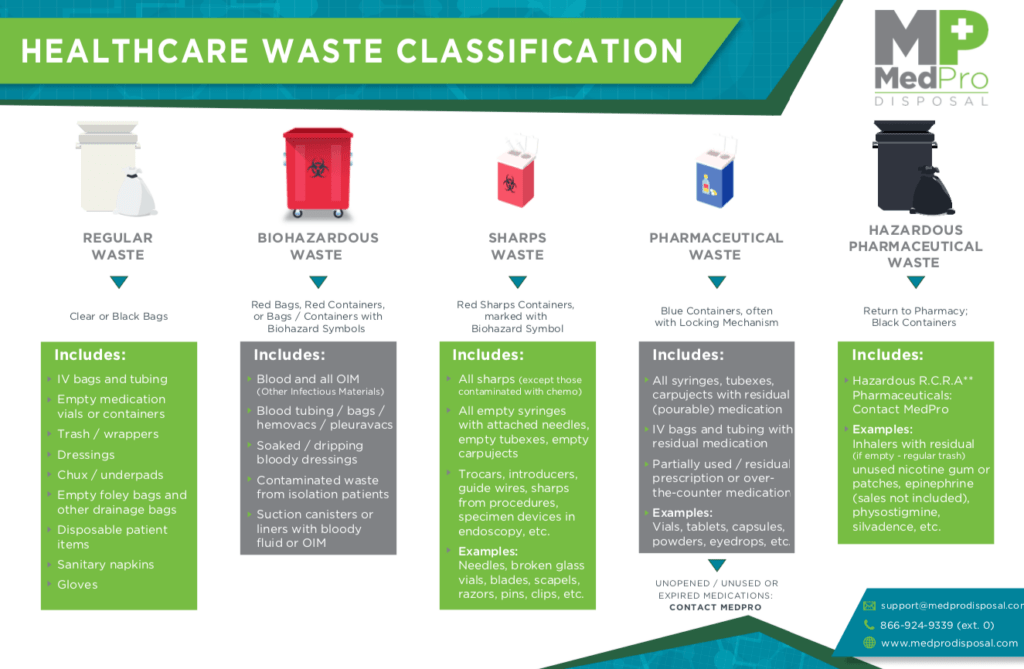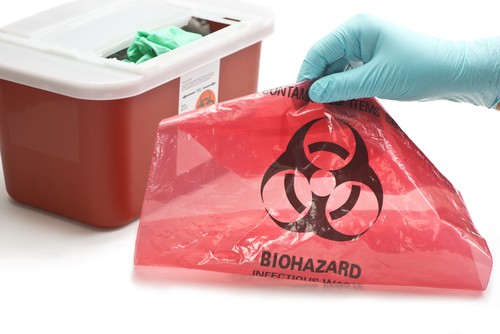Specialist Medical Waste Disposal Service: Safeguarding Your Facility and Community
Wiki Article
Proper Disposal Techniques for Clinical Waste
Proper disposal techniques for clinical waste are of utmost value in making certain the safety of both medical care workers and the public. The proper handling and disposal of clinical waste is crucial to avoid the spread of transmittable diseases and the contamination of the environment. This includes the secure disposal of sharps, contagious waste, and pharmaceutical waste. Following rigorous standards set by regulatory bodies is necessary to keep compliance with legal guidelines and secure public wellness. This intro will check out the importance of appropriate clinical waste disposal, supply standards for handling different kinds of waste, and highlight the need for medical care centers to embrace finest methods. By complying with these guidelines, doctor can add to a much safer and healthier environment for all.Significance of Appropriate Clinical Waste Disposal
Correct medical waste disposal is of utmost importance in order to stop the spread of infections and secure public health and wellness. Clinical waste refers to any kind of waste generated during clinical procedures or from the healthcare industry.One of the main reasons for appropriate medical waste disposal is to protect against the spread of infections. By securely disposing of medical waste, the opportunities of direct exposure to these pathogens are substantially decreased, making sure the safety of health care workers, people, and the neighborhood at big.
Moreover, appropriate clinical waste disposal is vital for securing public health and wellness. By following appropriate disposal methods, such as control, therapy, and segregation, we can minimize the prospective dangers linked with clinical waste and secure the wellness of the community.
Handling and Disposing of Sharps
When it involves the handling and disposal of sharps, adherence to appropriate methods is important for making certain the security of health care workers and protecting against the danger of injury or infection. Sharps include needles, syringes, lancets, and various other items with the potential to penetrate or reduce the skin. Due to their potential to transfer bloodborne pathogens, such as HIV and liver disease B and C, it is important to deal with and dispose of sharps correctly.
Disposal of sharps containers must comply with neighborhood regulations and guidelines (WasteX Medical Waste Disposal). It is essential to never ever evaluate needles or bend, break, or eliminate needles from syringes. When the container is full, it must be safely sealed and thrown away according to regional policies. It is best to utilize certified medical waste disposal solutions that specialize in the proper handling and disposal of sharps to make sure compliance with guidelines and decrease risks to health care workers and the setting.
Standards for Infectious Garbage Disposal
Infectious waste, also known as biohazardous or biomedical waste, refers to products that are possibly polluted with transmittable representatives or various other harmful materials. Correct disposal of infectious waste is vital to ensure the safety and well-being of healthcare workers, clients, and the general public.The guidelines for transmittable waste disposal differ depending on the country and regional guidelines, however there are some typical methods that medical care facilities ought to follow. All contagious waste needs to be set apart from other kinds of waste at the factor of generation. Transmittable waste should be delivered and disposed of by certified waste administration business that specialize in handling biomedical waste.
It is necessary for medical care centers to have comprehensive training programs in position to inform personnel on the correct treatments for infectious garbage disposal. This consists of training on waste partition, storage space, and handling strategies. By adhering to these guidelines, medical care centers can properly take care of infectious waste, minimize the threat of infections, and protect public wellness.
Finest Practices for Pharmaceutical Garbage Disposal
Drug garbage disposal should always be conducted frequently and based on professional standards. Appropriate administration of pharmaceutical waste is important to shield public health and wellness and the atmosphere. Pharmaceuticals can pose a significant danger if not taken care of appropriately, as they may infect water resources, harm aquatic life, and even contribute to the advancement of antibiotic resistance.Among the ideal techniques for pharmaceutical garbage disposal is to establish an assigned collection system within medical care facilities. medical waste removal. This system needs to include different containers for different sorts of pharmaceutical waste, such as expired medications, unused medicines, and contaminated products. These containers need to be clearly identified and situated in easily obtainable areas to motivate proper disposal by medical care experts
Moreover, it is important to educate healthcare personnel concerning the correct handling and disposal of pharmaceutical waste. Educating programs ought to concentrate on recognizing different kinds of pharmaceutical waste, comprehending the linked dangers, and complying with the suitable disposal procedures. Regular reminders and updates ought to be supplied to make certain conformity with disposal standards.
Along with interior methods, health care centers need to likewise establish collaborations with accredited waste monitoring firms. These firms focus on the collection, transportation, and disposal of pharmaceutical waste. By collaborating with these experts, health care facilities can make certain that their pharmaceutical waste is dealt with securely and in conformity with neighborhood laws.
Conformity With Legal Regulations
In order to make sure compliance with lawful laws, it is critical for healthcare facilities to abide by proper disposal techniques for medical waste. Clinical waste positions a substantial risk to public health and the setting, making it essential for medical care facilities to manage and get rid of of it based on the legislation.
Regulative bodies, such as the Occupational Security and Health Management (OSHA) and the Environmental Protection Agency (EPA), have established guidelines and needs for the proper disposal of medical waste - WasteX Medical Waste Disposal. These guidelines intend to secure healthcare employees, waste monitoring workers, and the general public from prospective hazards connected with medical waste

Non-compliance with legal regulations can result in extreme effects for medical care centers, consisting of penalties, lawful obligations, damage to credibility, and potential harm to public health. It is crucial for health care centers to remain updated with the latest regulations and continually monitor and enhance their waste administration practices.
Verdict
Adhering to guidelines for disposing and dealing with of sharps, contagious waste, and pharmaceutical waste is crucial. It is imperative that health care facilities preserve rigorous protocols for the appropriate disposal of clinical waste to minimize risks and preserve a safe medical care atmosphere.Medical waste refers to any kind of waste produced throughout clinical procedures or from the healthcare market. Contagious waste, additionally known as biomedical or biohazardous waste, refers to products that are possibly infected with transmittable agents or other harmful materials. All transmittable waste needs to be set apart from various other kinds of waste at the point of generation. Transmittable waste needs to be carried and disposed of by accredited waste monitoring firms that hop over to these guys specialize in dealing with biomedical waste.
Sticking to guidelines for taking care of and getting rid of of sharps, contagious waste, and pharmaceutical waste is crucial. (medical waste disposal service)
Report this wiki page